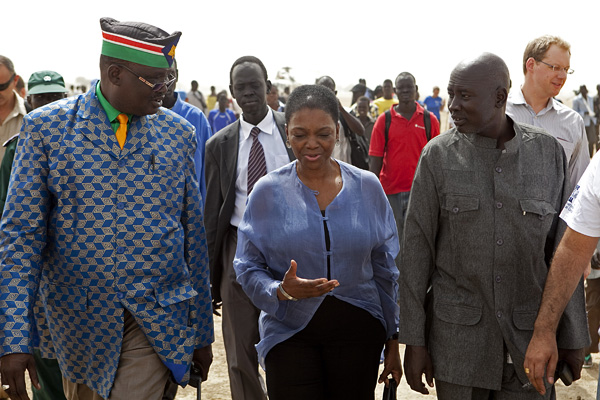
JUBA, South Sudan — The U.N.’s top humanitarian official, Valerie Amos, visited some scenes of the recent bloodshed in South Sudan yesterday and expressed concern about what she said is a deepening humanitarian crisis. Amos’ four-day visit to South Sudan comes on the heels of inter-tribal clashes in Jonglei state where about 140,000 people have been affected by the fighting.
Amos visited Pibor town in Jonglei state, the epicenter of recent violence between the Lou Nuer and Murle tribes.
“It’s a terrible situation, and I was able to see people who have lost their loved ones, their possessions and livelihoods,” she said at the press conference in Juba. Amos warned that the humanitarian crisis South Sudan faces is much broader than initially estimated when also factoring in the refugees from the southern states of Sudan, Blue Nile and South Kordofan.
“I’d like to emphasize my concern about the situation in South Sudan broadly,” she said. “The situation is very precarious, and the risk of a dangerous decline is very real. The scope of this crisis cannot be ignored.”
Humanitarian agencies are pre-positioning emergency supplies in Jonglei and have very limited time to assist those affected by the crisis before the rainy season begins in March or April. Access to the affected population is under most circumstances limited due to lack of infrastructure, especially paved roads. The dirt roads that exist will become muddy and impassable because of the rains, posing an even bigger challenge to aid agencies.
“Pre-positioning of supplies is the key,” Amos said.
OCHA estimates that 80,000 refugees from South Kordofan and Blue Nile are now in South Sudan and reports there is urgent need for increased food assistance and emergency relief. In addition, the World Food Programme, or WFP, warns that up to 500,000 refugees may ultimately flee to South Sudan due to growing famine in the southern states of Sudan.
“We have requested access to South Kordofan and Blue Nile from the Sudanese government,” Amos said. But such access is still not forthcoming.
The U.N. has made an appeal for $760 million from the international community to meet humanitarian needs in South Sudan for 2012. Amos warned that the crisis could be even wider and additional appeals would have to be made.
“I think that amount may increase as a result of some other actions that may happen, not only the oil shutdown but also if there’s a large movement from Sudan to South Sudan,” Amos said.
“We can only do so much,” she said, adding that the leadership of the South Sudan government is vital in humanitarian efforts. Amos is scheduled to meet with President Salva Kiir and other senior officials tomorrow, the last day of her visit.
At Thursday’s press conference, Amos sounded an alarm about recent moves by the South Sudanese government to shut down oil production. She warned that the decision would negatively affect many people in need, as the government’s loss of revenue hinders its ability to provide services. Oil accounts for about 98 percent of South Sudan’s budget.
“Humanitarian needs will inevitably increase, and the combined efforts of the government, the aid community, and the donors will not be enough,” Amos warned.
Photo: U.N. Under-Secretary-General for Humanitarian Affairs and Emergency Relief Coordinator for South Sudan, Valerie Amos, engages with local government officials in the village of Walgak (AP)

